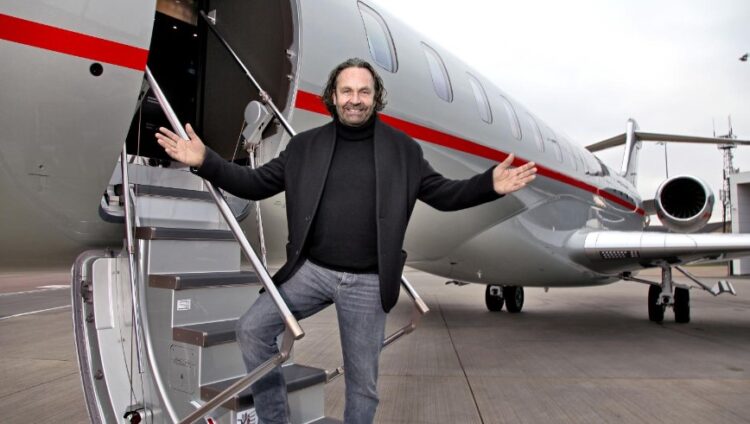Thomas Flohr has taken the private aviation industry by storm. In less than two decades, the Swiss entrepreneur — who worked in assets finance before turning his attention skyward — has defied the odds to become a major global power player. “I saw an opportunity,” Flohr recently told Forbes, “and I took it.”
The stats speak for themselves: Thomas Flohr’s holding company, Vista, is currently the second-largest charter or fractional private jet operator globally, according to data research and consulting company WingX. Outside of the United States, it’s already number one, with 350 private jets in its fleet. In June, Vista acquired both Jet Edge and Air Hamburg. Jet Edge — the eighth-largest charter/fractional operator in the U.S. — was Vista’s seventh successful acquisition since 2018 (previous ones include XOJET, JetSmarter, Red Wing Aviation, Talon Air, and Apollo Jets).
Thomas Flohr’s Power Moves

Flohr’s approach has always been a modern one. He was disillusioned by what he saw when became an “occasional” user of the private jet charter market while traveling for work in the early 2000s. “What really struck me was the inconsistency of what you’re getting when you arrive at the airport,” he told Forbes. “You don’t even know what you get because you booked a plane, and then one that shows up doesn’t look like what was in the pictures.”
The whole experience was fragmented, and he wanted to change it. He purchased his own plane, a Learjet, and began chartering it out when he wasn’t using it to offset some of the ownership costs. Efficiency quickly became an issue when he realized the plane had to be returned to its base following each and every flight. “Somebody would fly to Cairo, and then they would fly it back to Zurich empty. It made no sense,” he explained to Forbes.
He decided to create a floating charter model — think ride-sharing, but in the sky — which filled more seats and turned a nice profit. Within a year, he scooped up three more planes, and in 2005, he became the owner of Air Executive. “Thomas is the smartest person in the room,” an exec who has worked closely with Flohr told Forbes. “He’s operating a dozen steps ahead of other people, and he doesn’t necessarily show his cards. The model he created with VistaJet is truly disruptive.”
Flohr was offering something new: guaranteed availability on a private jet, without the hassle or price tag of fractional ownership. Flohr told Forbes: “We said, ‘Well, let’s offer an alternative to fractional.’ We told customers, ‘Finally, you have an alternative.’”
Branching Out

Between 2015 and 2017, Flohr massively expanded his fleet. “We took delivery of 36 Globals and we ended up having the 36 Globals and 36 Challengers,” he revealed to Forbes. Then, he really began wheeling and dealing. In 2017, Rhône Capital invested $200 million in VistaJet in a deal valuing the company at $2.5 billion and enabled Flohr — who previously owned 100% of the company — to hang on to a large majority stake. “With the investment announced today, we are ideally placed to take advantage of market consolidation, and to build on our position in the sector,” he told Corporate Jet Investor at the time.
Having solidified Vista’s reach globally, Thomas Flohr turned his attention to the light jet market. “In the COVID world, we saw that people enter this industry not by flying a Global; they want to first try the industry on small airplanes,” he told Forbes, “so we came back to the light charter market, and here we are.” He acquired Red Wing Aviation to cater to people traveling short routes such as Oklahoma City to Little Rock, Arkansas, with a plan to triple the fleet.
He soon bought Apollo Jets, a New York-based mega-broker with $250 million in annual charter bookings, and Talon Air, an operator that came with both a stable of managed aircraft and a new extension of Flohr’s business: aircraft management.
Looking Ahead

As 2024 approaches, Thomas Flohr has his work cut out for him. Among his biggest challenges? Figuring out how to integrate Air Hamburg and Jet Edge. Air Hamburg is heavy on managed aircraft but mainly sold wholesale. In comparison, Jet Edge grew rapidly when it moved from the wholesale market to a consumer brand, launching a jet card program branded under the Reserve label, and like VistaJet, specializes in super-midsize and large cabin jets.
With obvious overlaps between VistaJet, XO, and Jet Edge — all have membership offerings with a combination of fixed and dynamic pricing options — Flohr wants to distinguish one from the next. VistaJet had required customers to commit to a minimum of 50 hours per year for entry into its membership program, and in September, it launched VJ25, a program that starts at just 25 hours per year and gives customers access to the group’s entire fleet, including those Global 7500s. (According to Forbes, VJ25 also offers flyers fixed rates and guaranteed availability for transoceanic flights and flights to Hawaii.)
Meanwhile, the company has eliminated XO’s Elite Access program and now offers dynamic pricing for XO members (the price of each trip is based on market rates, depending on the destination and when flights are booked). Flohr is hoping XO’s crowdsourcing model — which allows customers to share flights and purchase individual seats — will take off. He wants XO to be the online marketplace for the charter industry.
As with all of Flohr’s endeavors, there are risks. But they have measured ones — the Dubai-based businessman, and the occasional race car driver is constantly studying the data. When asked by Forbes how he keeps track of his sizable empire, he said, “I have every single data point you can think of all automated live. There are so many tons of data on yield … I can dig down to every single flight.”
Competitors are nipping at his heels, as always. In 2021, industry leader NetJets returned to Asia with its investment in Amber Aviation, which is based in Shenzhen, China. Directional Aviation — owned by Kenn Ricci — is expanding its Flexjet fractional ownership program in Europe as well as its PrivateFly charter brokerage. Wheels Up, helmed by CEO Kenny Dichter (who bought U.K.-based charter broker Air Partner earlier this year), is also hoping to expand beyond its U.S. base.
Flohr isn’t too worried. If there’s one thing he knows how to do, it’s thinking outside the box. His resourcefulness was on full display when he came up with VistaJet’s brand name years ago. He told Forbes he rejected suggestions to fork over “hundreds of thousands of dollars” to a branding company, and came up with the moniker himself while having a cocktail with a colleague. He said he was inspired by Microsoft’s launch of its operating system, Vista, and began spitballing ideas. “Microsoft has a big marketing budget. The word vista makes sense, looking at the window of an airplane … Let’s get on the back of Microsoft. Vista and jet, VistaJet — that was done for the price of a few drinks.”
 Hi Boox Popular Magazine 2024
Hi Boox Popular Magazine 2024



